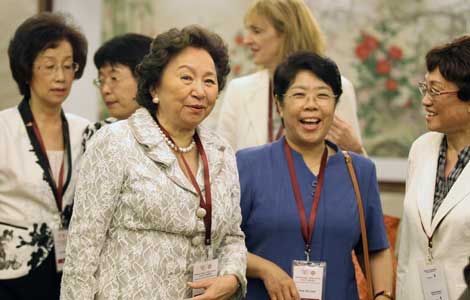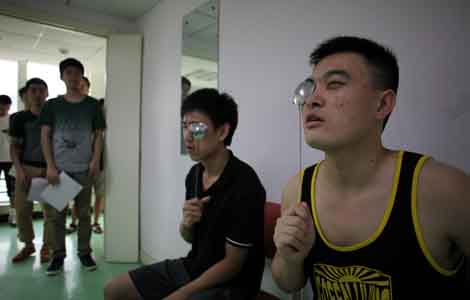Plastic surgery fraught with danger
Updated: 2013-08-13 07:27
By Cesar Chelala (China Daily)
|
||||||||
An increasing number of people in countries around the world, including China, are resorting to cosmetic surgery to enhance their appearance. These people should be aware that surgery of any kind carries inherent risks and could become a burden on a country's public healthcare system. And apart from failing to solve a problem, a surgery could create new ones.
In China, a growing number of people are undergoing plastic surgery, especially during the summer vacation, in the hope of improving their "looks" as well as increasing their job prospects. The cost of cosmetic surgery - from about $300 for a facelift to thousands of dollars for other procedures - does not deter them. Many even borrow huge sums to meet the cost.
The dramatic economic, cultural and political changes in China have given an increasing number of women the opportunity to enter the job market. The opportunity, however, has also become a source of anxiety for women because of employers' preference for younger, more physically attractive candidates. For example, a survey of the job postings in 2003 showed that a majority of them were open only to applicants below 30.
In China, women who remain single in their late twenties are still referred to as shengnu or "leftover women" by relatives, the media and society in general. These women have to fight against society's prejudices to be considered equal to men. Discrimination against women is not new. In the 1990s, nearly a quarter of China's workforce (about 24 million) was laid off, and a majority of them were women. Not only that, these women faced discrimination even when they tried to get employment anew.
For many public health experts, however, young people's (mostly women's) demand for cosmetic surgery reflects China's transition to a consumerist society. China, in fact, has become the largest market for cosmetic surgery in the world. But in terms of population to surgery ratio, the Republic of Korea leads the world's plastic surgery market. The United States is also among the leading countries in the use of cosmetic surgery, so is Brazil where women far outnumber men as patients for the procedure.
Among the most common cosmetic surgeries performed in China are eyelid surgery, nose jobs and liposuction. However, the frequent use of another kind of surgery is worrisome: "leg stretching" which people in other countries rarely resort to. When used for purely cosmetic reasons, "leg stretching" involves risks such as bone infection, injury to blood vessels and/or nerve damage.
One of the problems of cosmetic surgery is that it can easily become a contagious phenomenon. Lawmakers in the US have tried to curb the abuse of cosmetic surgery by proposing a 5 percent tax on elective cosmetic surgery, a policy that could be emulated by countries where the phenomenon has become rampant. Of course, like the US, these countries have to exempt cosmetic surgeries performed to fix birth defects, such as clefts, and disfiguring by diseases or accidents, from the tax.
A study on the effects of cosmetic surgery conducted in Norway found that women who underwent cosmetic surgery were more likely to have poorer mental health, including depression and anxiety. The study also found that in many cases cosmetic surgery didn't solve the problems it was supposed to. And in some cases, it even aggravated the problem. Many experts believe that those who mainly benefit from the procedure are surgeons, other medical practitioners and hospitals that charge huge amounts for performing them.
Robin T.W. Yuan, one of the top plastic surgeons in the US, has said: "It is clear to me that people are led as much today by media and celebrity as by our profession's relentless marketing. Too often, I have seen people's misconceptions lead to inappropriate, unsatisfactory and even harmful surgeries."
Cosmetic surgery is not the only way for women to attain physical beauty. Many Chinese women, in response to their categorization as shengnu have started saying, yes, we are shengnu, but sheng as in "victorious", the word's other meaning. Their message should be spread among people across the country.
The author is an international public health consultant and a co-winner of an Overseas Press Club of America award.
(China Daily 08/13/2013 page9)
Most Viewed
Editor's Picks

|

|

|

|

|

|
Today's Top News
Rare earth alliance to fight Japan's patent barrier
Terrorist leaders sentenced to death
'Not just about resources'
H7N9 patient dies in Beijing
'No worry' on wheat imports
Equities take a benefit from improving data
US man kills 9-year-old son, himself
Taking on Sinophobia through education
US Weekly

|

|














